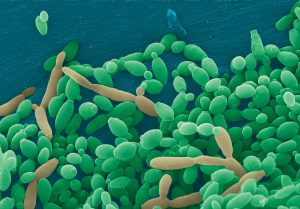Candida Overgrowth – 25 Signs You May Have It
Candida Overgrowth can go undetected for a long time. Most people infected with candida are unaware of the yeast infection and they look very healthy on the outside. However when Candida population increases, it is able to penetrate the bloodstream through the walls of the intestines and cause a condition known as leaky gut syndrome.
Candida Overgrowth Symptoms Can Include:
- Abdominal pain
- Allergies
- Anxiety
- Autoimmune diseases like Hashimoto’s thyroiditis, rheumatoid arthritis, ulcerative colitis and multiple sclerosis
- Bloating and belching
- Cognitive disorders like poor memory, concentration problems and brain fog
- Constipation
- Craving sugar and refined carbohydrates
- Depression

Candida Overgrowth Yeast Infection
- Diarrhea
- Endometriosis
- Fatigue
- Flatulence or intestinal gas
- Halitosis or bad breath
- Impotence
- Infertility
- Insomnia
- Irritability
- Joint pains and swelling
- Low libido
- Muscle aches, weakness and paralysis
- Mood swings
- Rectal itching
- Skin conditions like athlete’s foot, fungal nail infections, eczema, psoriasis, scleroderma and systemic lupus
- Vaginal itching, burning and discharge
These symptoms are also associated with numerous other conditions which make diagnosing Candida infection quite challenging.
Factors which lead to an increase in the candida population include:
- Eating a diet rich in processed foods
- Drinking a lot of alcohol
- Taking antibiotics that kill the good bacteria in the intestines
Once the candida penetrates into the bloodstream, it triggers a cascade of infectious symptoms. It enters the blood stream by penetrating the protective mucosa lining within the intestines and throughout our bodies.
What is Candida?
Candida is a type of yeast which normally lives in the intestines in small amounts and aids the digestive process.
Julia Koehler, a Harvard University estimated that candida was responsible for around 60% of the fungal infections acquired in hospitals and it resulted in the deaths of every 1 out 3 infected persons. She reported that the fungus was dangerous because of its ability to change from a minor infection into a severe infection when the person developed low immunity.
Studies by Rice University reveal that around 70% of all people are affected by Candida. Research published in the Journal of the German Society of Dermatology found that Candida albicans was the species responsible for between 50 to 90% of all the candida infections (1).
Tests for Candida Overgrowth Yeast Infection
Candida infection can be tested by a blood test. This test checks for levels of antibodies to candida known as IgA, IgG and IgM. A Comprehensive Stool Test can also show positive Candida even when blood testing is negitive since the blood only checks for antibodies and not the actual yeast. Further, a Urine Test that looks for the yeast waste product that is called D-arabinitol can determine the presence of Candida overgrowth if elevated results is positive.
Treatment of Candida Overgrowth Yeast Infection
Once the candida infection is confirmed and its severity assessed, the treatment of candida often includes a comprehensive plan that can include the following:
- Eliminating simple sugars like candy, deserts, chocolates, alcohol and flour from the diet since this fungi feeds on them.

- Reducing the intake of complex carbohydrates like whole grains, beans, fruit, pasta and potatoes to further reduce the population of candida in the intestines.
- Taking caprylic acid supplements which are obtained from coconut oil as it helps kill the yeast cells.
- Taking probiotics to increase the concentration of the good bacteria in the gut and keep the candida in check.
You may read some herbalist recommending Oregano Oil. We do no recommend this as it kills all yeast, even the good ones you need.
Be proactive in your health. Heal your gut. Eat whole raw vegetables to your heart’s desire. Introduce foods known to fight Candia. Alkaline your diet.
References:
1. J Dtsch Dermatol Ges. 2013 May;11(5):381-93; quiz 394. doi: 10.1111/ddg.12097.










